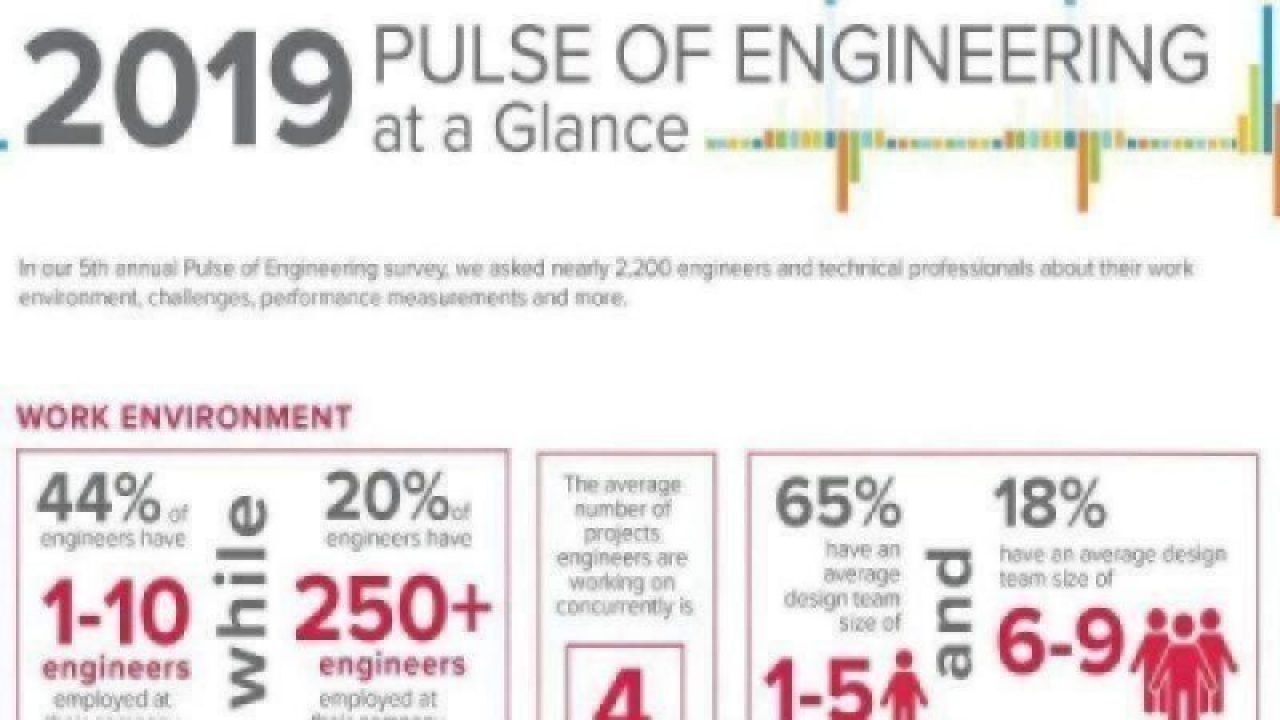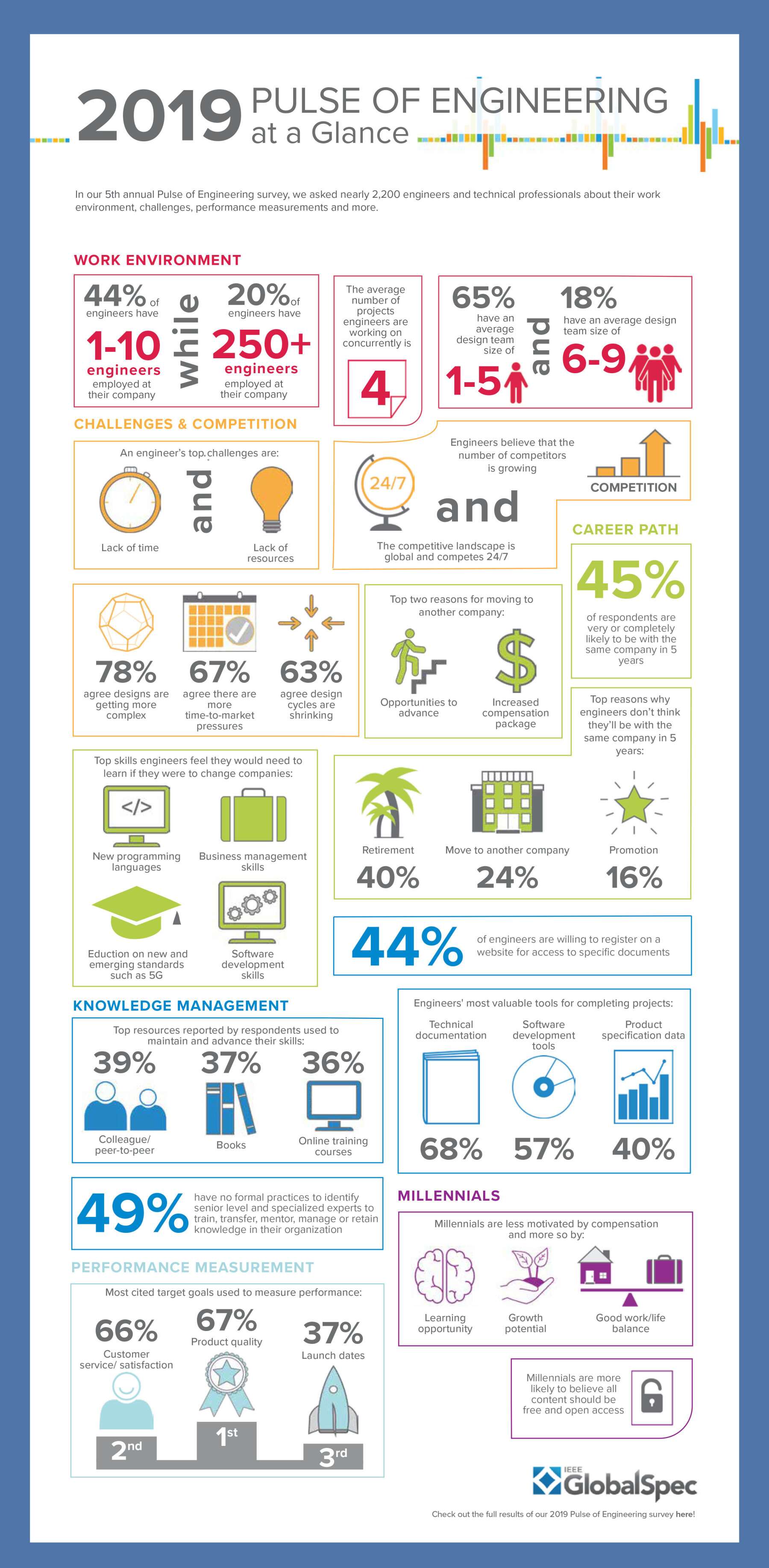Engineer Survey: Some Things Change Never Change
Article By : Martin Rowe

The 2019 IEEE GlobalSpec Pulse of Engineering survey shows the age-old problem of "do more with less." Yet, engineer opinions have moved since last year.
"Do more with less." Where have we heard that before?
No matter what the economy is doing, engineers will always say that they lack the time and resources to do their job. That’s what we hear (again) in the 2019 IEEE GlobalSpec Pulse of Engineering survey. The survey also shows some differences from 2018.
In just a year, the perception of what’s important in an engineering project has changed. This year, the survey shows greater emphasis on quality and customer satisfaction with a product than in 2018. While the percentage changes are relatively small, they’re noteworthy.
The survey asked “What target goals/objectives are used to measure your team/department performance? Table 1 highlights the differences in just a year.
The survey results in Table 1 how an increase in importance for quality and customer satisfaction with a decrease in the importance of hitting launch dates. A similar question, "What is the single most important performance target that you are pressured or incented to meet?" showed results consistent with those in Table 1. Do you see a similar trend at your job? Is customer satisfaction becoming a priority over getting your product to market?
No matter if the economy is shrinking or expanding, a significant portion of engineers report that they're always expected to "do more with less." That thought is always near the top of the list when asked "Which conditions do you believe accurately portray the situation at year company? Table 2 compares the answers to several questions from 2018 to 2019.
| Objective | 2019 | 2018 |
| Product quality | 67% | 60% |
| Customer service/statisfaction | 66% | 57% |
| Launch dates | 37% | 49% |
| Revenue target | 32% | 34% |
| Development budget | 31% | 34% |
| Unit cost | 36% | 28% |
| Service/warranty cost | 16% | 9% |
Table 1. Comparison of important engineering metrics 2019 vs. 2018.
| Question | 2019 | 2018 |
| The pace of engineering is constantly increasing | 52% | 55% |
| We are required to do more with less | 50% | 53% |
| Technology is improving productivity | 48% | 38% |
| Pressure to meet deadlines is putting product quality/rework at risk | 37% | 40% |
| We lose specialized knowledge and senior expertise faster than we gain it | 37% | 38% |
| Pressure to cut costs is putting product quality/rework at risk | 36% | 37% |
| New hires are being added to handle additional work, not just to replace staff vacancies | 28% | 38% |
Table 2. “Which conditions do you believe accurately portray the situation at year company?” (partial answers).
Comparing Table 1 and Table 2, we see that while customer satisfaction and quality beat out pressure to make launch dates. More than one-third of engineers still say that deadlines and cost affect quality. The published survey results don’t tell us the industry affects the survey results. For example, does working on consumer products put more pressure on deadlines and less pressure on quality than if an engineer works on military/aerospace designs? What if being first to market is everything? What if you have a consumer product that has to be ready for the holiday season or an industrial product that has to be ready for an annual trade show? What about software products? Is it better to meet deadlines and issue patches rather than miss a deadline with a superior product?
While most of the 2019 results were close to those of 2018 (statistical uncertainly not given), one that stands out is “New hires are being added to handle additional work, not just to replace staff vacancies” that dropped from 38% to 28%, but why? Here again, knowing the industry would help as well as why did the percentage drop so much in 2019? Is it possible that the economy is so good that companies have trouble finding qualified engineers or is there a reluctance to hire resulting from a fear that a slowdown is coming?
The survey also compares some answers between “millennials” and “veteran” engineers. Here, the survey takes on a more marketing tone, asking how engineers gain knowledge and educate themselves. Millennials are more likely to rely on colleagues and videos than veteran engineers while veteran engineers favor conferences and webinars. In the case of younger engineers relying on colleagues and peer-to-peer interaction to gain knowledge, are the millennials getting that knowledge from veteran engineers of from other millennials, perhaps through online forums? We don’t know.
What’s going on at your place of work?
Subscribe to Newsletter
Test Qr code text s ss



